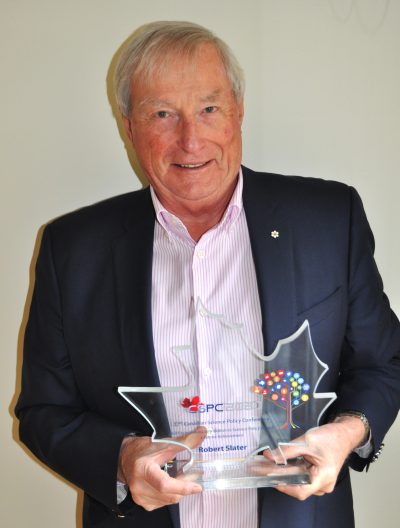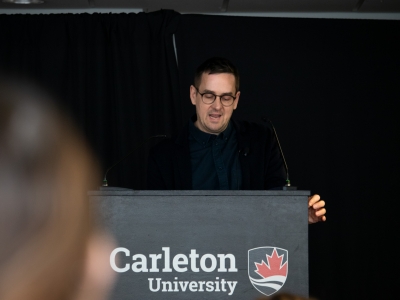
Robert Slater, Recipient of CSPC 2020 Exceptional Contribution to Science Policy – Lifetime Achievement. Photo courtesy of Robert Slater.
Since completing his PhD at the University of London, Imperial College of Science and Technology in 1967, Robert Slater, adjunct professor in the School of Public Policy and Administration (SPPA), has been working full-steam to move research into action.
Throughout his career, Slater has been the bridge between scientists, policy researchers, regulators and ministerial staff that has resulted in actionable policy. Slater assumed leading roles in national and international negotiations as a means of achieving significant improvements in water and air quality in the last five decades.
In an online celebration on November 17, Slater received the CSPC 2020 Exceptional Contribution to Science Policy Award in the Lifetime Achievement category.
The award was presented by Mehrdad Hariri, CEO and president of the Canadian Science Policy Centre.
Hariri said, “Dr. Slater has made a tremendous impact on science and innovation policy over the course of his career. He has significantly influenced the regulatory machinery that protects the environment.”
As a public official, Slater’s goal was to help politicians deliver vital improvements in Canadian environmental legislation. Slater is widely recognized as a driving force behind the 1991 acid rain agreements between Canada and the United States. After years of research, lobbying and negotiating, Slater, as assistant deputy minister at Environment Canada, brought forward proposals for a far-reaching Canada-U.S. Air Quality Agreement. The acid rain accord made major changes to the environment — largely eliminating the threat of acid rain — and demonstrates how collaboration and the effective implementation of evidence-based legislation can solve serious environmental problems.
Another striking example of his ability to foster collaboration is evident in his work with the provinces to set Canada-wide air quality objectives to mirror the acid rain agreement. By 1998, this evolved to a process to set the Canadian Ambient Air Quality Standards.
In recognition of these and many other contributions to Canada’s environmental policy, in 2009, Slater was appointed a Member of the Order of Canada.
Building a Community of Regulators
After joining the School in 2003, Slater taught environmental policy graduate courses, including Politics, Policy and Management of Water in the Master of Public Policy and Administration program. Slater is also an affiliated researcher with Carleton’s Global Water Institute. Slater says, “When I joined SPPA, I immediately felt welcomed into the Carleton community as a practitioner, rather than an academic. Over the years, I have enjoyed many collaborations on projects and papers with faculty and students from diverse backgrounds. An award like this — especially a lifetime achievement — has prompted me to reflect.”
In 2007, Slater, along with chemistry professor David Miller, led the Regulatory Governance Initiative (RGI) at Carleton to address the training needs of both senior and entry-level scientific regulators in governments. He says his goal was to develop capacity and competence through regulatory policy, governance and management. Equally important, the goal of program was to create leaders who could solve problems using scientific research and bring order to “messy situations.”
With students, trainees and colleagues, Slater emphasizes the need to be an excellent listener, to be trustworthy and to be continually curious.
“Dr. Slater has been an integral part of SPPA — as a mentor, course instructor, research collaborator and strategic leader,” says Graeme Auld, the School’s director. “In the classroom, he helped students understand the intricacies of environmental and water policy. As a mentor, he continues to connect students with opportunities through his deep and broad professional network. As a research collaborator, he has co-authored book chapters and peer-reviewed journal articles with graduate students and faculty members.”
As a strategic leader, his vision and dedication led to RGI where he served as executive director. For many years, Slater said that regulators lack a professional identity and shared feeling of community. The two certificate programs are fundamental steps to nurturing such a professional group identity, a development that will have long-lasting benefits for the regulatory community in Canada.
The first cohort of RGI’s newer entry-level program, Career Development for Regulatory Professionals (CDRP), graduated in 2018.
Making a Difference to Future Generations
Slater was awarded an Honorary Doctor of Laws from Carleton University in 2019 for his distinguished career in the public service, his initiatives to protect air and water and for inspiring others into environmental leadership.
This year, at the CSPC award ceremony November 17, Slater said, “Science for the public good is the bedrock for major issues such as COVID-19 and climate change. The maxim remains, if you don’t get the science right, you’ll never get the policy right. The scientific method is universal. The policy regime is not. The key challenge is to maintain the integrity of the scientific process, which can be subjected to extraordinary pressure.
“I have the highest regard for good scientists. Ones who have authoritative views and generate a broadly-based consensus and can communicate up, down and sideways. In the environment area where I worked, they were always passionate about their field and dedicated to their professional careers.
“We are all bombarded by the here and now, but acting in the short term can be the enemy of the important.” When he was teaching, Slater would ask his students to reflect on whether or not their great-grandparents would be proud of them. Also, if their great-grandchildren would be grateful to them.
Slater said, “By answering such questions, we start to know ourselves better — the ultimate gift we can give ourselves and to others.”
Monday, November 23, 2020 in News, School of Public Policy and Administration
Share: Twitter, Facebook



